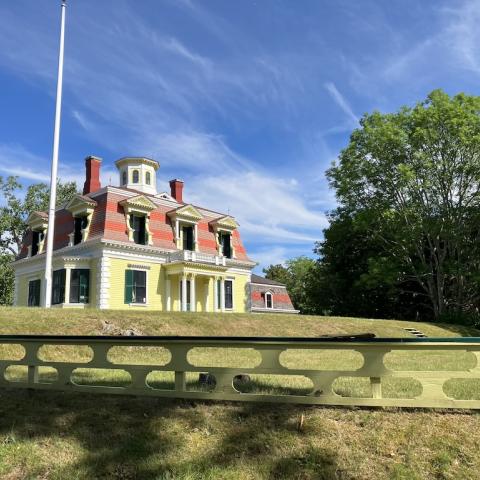While the federal hiring freeze has been lifted by the Trump administration, its guidelines for Reforming the Federal Government and Reducing the Federal Civilian Workforce, as a memo sent out last week from the executive director of the Office of Management and Budget stated in its subject line, carries an ominous message for the National Park Service.
"Despite growing citizen dissatisfaction with the cost and performance of the federal government, Washington often crafts costly solutions in search of a problem. Too often the focus has been on creating new programs instead of eliminating or reforming programs which are no longer operating effectively," wrote OMB Executive Director Mick Mulvaney. "The result has been too many overlapping and outdated programs, rules, and processes, and too many federal employees stuck in a system that is not working for the American people. Through the actions described below, President Trump aims to make government lean, accountable, and more efficient."
Among the key points made by Mr. Mulvaney to federal agencies:
- Don't duplicate what another agency is doing.
- If a program doesn't strictly adhere to an agency's core mission, get rid of it.
- If a state or tribal government, or even the private sector, can better manage a task, let it.
- If the costs of a program "are not justified by the unique public benefits it provides," eliminate or restructure the program or figure out how to make it more efficient.
- If the long-term savings accrued from shutting down a program or merging agencies are greater than the costs, either improve the efficiency of the program or eliminate it.
Interior Secretary Ryan Zinke, in a short statement, indicated his willingness to cut and reduce where possible in his department, which oversees not just the National Park Service but also the U.S. Bureau of Land Management, U.S. Fish and Wildlife Service, and U.S. Bureau of Reclamation.
"I fully support President Trump and taxpayers' vision to reorganize the federal government in a way that will make the executive branch more lean, accountable, and efficient while still allowing the government to deliver core services," the Interior secretary said. "I approach this job like I approached every command I was tasked with in the Navy: empower the front lines, cut the waste, fraud and abuse, hold people accountable, and do more with less. I won't be afraid to make investments where appropriate and I look forward to working with the career veterans as we approach this mission together."
Though a bit early to make hard predictions for how the Park Service, which has yet to see a director nominated, will fare under the OMB directive, it's not too early to speculate. After all, the Park Service itself has acknowledged that its programs often extend outside the boundaries of the National Park System.
Much of the work of the National Park Service is seen and experienced by the public — just not in the national parks. The Service manages programs that reach far beyond national park boundaries. Although the programs operate mainly outside the national parks, they form a vital part of the NPS mission and help sustain and enhance the quality of life throughout America. -- National Park Service Programs
With that said, here's a look at some programs in and outside the National Park System that could perhaps be impacted by the OMB directive:
- Might the Park Service's climate change program be shelved, as the Trump adminstration frowns on the science behind climate change predictions.
- There already have been calls to have states assume some of the law enforcement responsibilities on federal lands. U.S. Rep. Jason Chaffetz, a Utah Republican, has introduced a measure calling for the termination of law enforcement functions of the Forest Service and the Bureau of Land Management and to provide block grants to states for the enforcement of "federal law on federal land under the jurisdiction of these agencies." Will the Park Service law enforcement arm be added to this bill as it progresses?
- Campgrounds in some units of the National Park System already have been turned over to private companies to manage. Will all campgrounds in the park system be turned over to private companies? What about interpretive programs?
- The Federal Lands to Parks Program "(H)elps communities create new parks and recreation areas through the transfer of surplus federal land to state and local governments." In light of the desire by some in Congress to reduce the size of the federal footprint, might there be an effort to transfer more land to state and local governments?
- Under the National Trails System, the Park Service helps oversee what it has acknowledged to be a "complex" system of partnerships. "The interface between trail administration (trail-wide coordination) and trail management (local on-the-ground activities and services) means that many federal, state, and local agencies; tribal groups; nonprofit organizations; and individuals may be involved." Should the states, tribes, and local governments take full control of these trails and leave the Park Service out?
- The American Battlefield Protection Program "promotes the preservation of significant historic battlefields associated with wars on American soil." The Civil War Trust is self-described as "the largest and most effective nonprofit organization devoted to the preservation of America’s hallowed battlegrounds." As such, should it take over this program from the Park Service?
- At the Property and Environment Research Center, staff have in the past suggested to Congress that parks with relatively small visitation "could ... be turned over to private, non-profit groups with a one-time endowment to fund maintenance."
- Might the private sector take over from the Park Service the National Center for Preservation Technology and Training, which is tasked with advancing "the application of science and technology to historic preservation. The NCPTT accomplishes its mission through training, education, research, technology transfer, and partnerships in the fields of archaeology, architecture, landscape architecture, and materials conservation." There are, after all, a good number of programs (and here) outside the federal government that focus on historic preservation.
- Will there be a move to turn more lighthouses over to outside groups to preserve? Should the Park Service continue to pay for and maintain lights such as those at Apostle Islands National Lakeshore, Cape Cod National Seashore, and Cape Hatteras National Seashore, or can private foundations better handle the tasks?
- Will the Trump administration, which promotes putting America first, dismantle the Park Service's Office of International Affairs, which aims to help international partners to protect environments, work in areas of historic preservation, and preserve endangered species, just to name cite three areas.
It remains to be seen which, if any, Park Service programs will be targeted for elimination, but as the above examples indicate, more than a few fall under OMB's guidelines directing agency heads to "eliminate activities, restructure or merge, improve organizational efficiency and effectiveness, and workforce management."






 Support Essential Coverage of Essential Places
Support Essential Coverage of Essential Places







Comments
All of the programs cited in this article will disappear when this policy is fully implemented. Not one will survive. Let us hope the next Director of the Service will fight to protect the programs and integrity of the National Park Service.
Don't know where the list came from but it would be a great start for Zinke.
If this policy is fully implemented all of the programs cited in this list will be eliminated. Much will depend on who the Trump Administration names as the next Director of the National Park Service and how willing this person wiill be to fight for these programs. Overall, the future does not look good.
What many don't seem to understand is that the NPS has been tasked by Congress -for better or worse- with many programs that focus outside park boundaries. Perhaps the law should be changed - but neither Trump, nor OMB, nor Zinke can just pull all of these plugs by themselves.
You are correct anonymous, many of these programs have been tasked by the Congress in previous years. This gives us some hope. Thank you for the information. Over all I still think the National Park Service is in for some hard times.
If events at the White House and Mar A Lago in the last week are any indicator of policy, all we need to do is get President Xi to tell Donald that our National Parks are valued by thousands of Chinese visitors, stroke the Great Ego a little and Voila! we'll witness an instant 540 degree spinning flippity flip and the parks will be fully funded, fully staffed and the maintenance backlog will be gone.
If only it was that easy.
Can someone tell me how turning a historic or scenic trail that spans thousands of miles and passes through multiple states, counties, cities, towns, tribal lands, etc. etc, over to state or local or tribal administration can be an improvement? The need for a single administrative agency for these trails who can coordinate among the many partners is essential and it has been working very well for most trails. When that is lacking, such as on the Old Spanish Trail, which is jointly administered by the NPS and BLM, you can end up with chaos. It is been proven to be impossible to get 5 separate BLM state offices to coordinate among themselves and agree on anything. The trail Comprehensive Management and Use Plan that was basically completed years ago and, which the NPS is ready to finalize, remains as a draft due to BLM inability to make decisions.